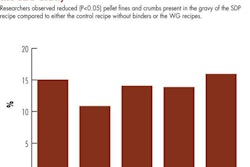While the US federal government shutdown may threaten legislative-related activity, such as the pending release of the preventive control rule for feed (including petfood) under the Food Safety Modernization Act, plenty of things are still happening at the state and local level. For example, a proposed law on the ballot for November 5 elections in Washington state that would require labeling of genetically modified foods is causing a war of words that has ensnared petfood.
During last year's US fall elections, a similar initiative in California, known as Prop 37, appeared headed for passage until many groups from outside the state, including some tied to the petfood industry, poured US$44 million into an advertising campaign to defeat the proposition. One of the tactics used to sway voters, reportedly, was to exploit confusing and poorly written language in Prop 37 that would have appeared to have targeted petfood that might contain GMOs.
Now this "playbook" is being deployed in Washington, says Jim Camden, a reporter for the Spokesman-Review. He reports that the "opening salvos" of an ad campaign have hit and are on track to make the proposed law, called Initiative 522, the most expensive issue on the state's ballot next month. As of mid-September, the campaign against the initiative already had US$11 million in its coffers, while the "yes" campaign had only US$3.5 million -- but both war chests are expected to increase dramatically by the time of the election.
The two sides dispute whether petfood would be affected if I-522 passes. "Food you buy for Rover would have to be labeled, if it contains those products, recent commercials for opponents say, but steaks you throw on the grill would not," Camden writes. "Wrong on both counts, say supporters of Initiative 522. Petfood isn’t covered by the initiative, but genetically modified meats would have to be labeled if they ever reach the local supermarket."
Apparently the Washington initiative suffers from the same unclear language that plagued Prop 37 in California, which may doom it to defeat. If it passes, it could have profound effects on petfood labeling nationwide. In writing about Prop 37 after its defeat last year, David Dzanis, DVM, PhD, DACVN, and author of the "Petfood Insights" column, noted, "While it only affected foods sold in California, on a practical basis most companies would have had to revise labeling (or reformulated products using more costly and less available ingredients) for all states in the US."
This could be the case if I-522 passes. And even if it doesn't, the issue of GMO labeling is not going away, Dzanis stated last year -- and he's already been proven correct. Another aspect to this issue that I don't believe most consumers understand is pointed out by Dzanis in his reference to costly and less available ingredients. Whatever your stance on GMOs, it's a fact that as the world's population grows and incomes rise, it will become more and more difficult to feed everyone, especially to supply increasing demands for meat. And livestock eat grains, which also have supply issues. Compounding this challenge is that the petfood industry is increasingly competing with the human food industry for the same sources and ingredients, as pet owners continue to humanize their pets.
In an effort to educate consumers, two groups have established new online portals to help explain GMOs. One, rather surprisingly, is a biotech organization, the Council for Biotechnology Information (CBI). (Scientists proactively reaching out to laypeople? Who knew!) The goal of its portal, GMO Answers, is to "invite skepticism and show humility," according to a representative who spoke at the 2013 Joint Feed and Pet Food Joint Conference last week. The idea is to invite the public to post comments and questions about GMOs, with scientists from throughout industry, academia and various organizations providing answers based on research and data. After launching this past summer, the site had 570 questions posted within eight weeks, CBI said.
The other website comes from the Grocery Manufacturers Association (GMA). Facts About GMOs, which just launched September 10, takes a more direct approach, stating right on the homepage that GMOs are safe. GMA also convinced its member companies to post similar statements, all using the same wording, on their own websites (though most of those statements are not on the company homepages).
Nevertheless, the non-GMO camp has strong advocates, too, including in petfood. Last week Wellness Natural Pet Food announced that its dry dog and cat foods are now free of GMOs.



















